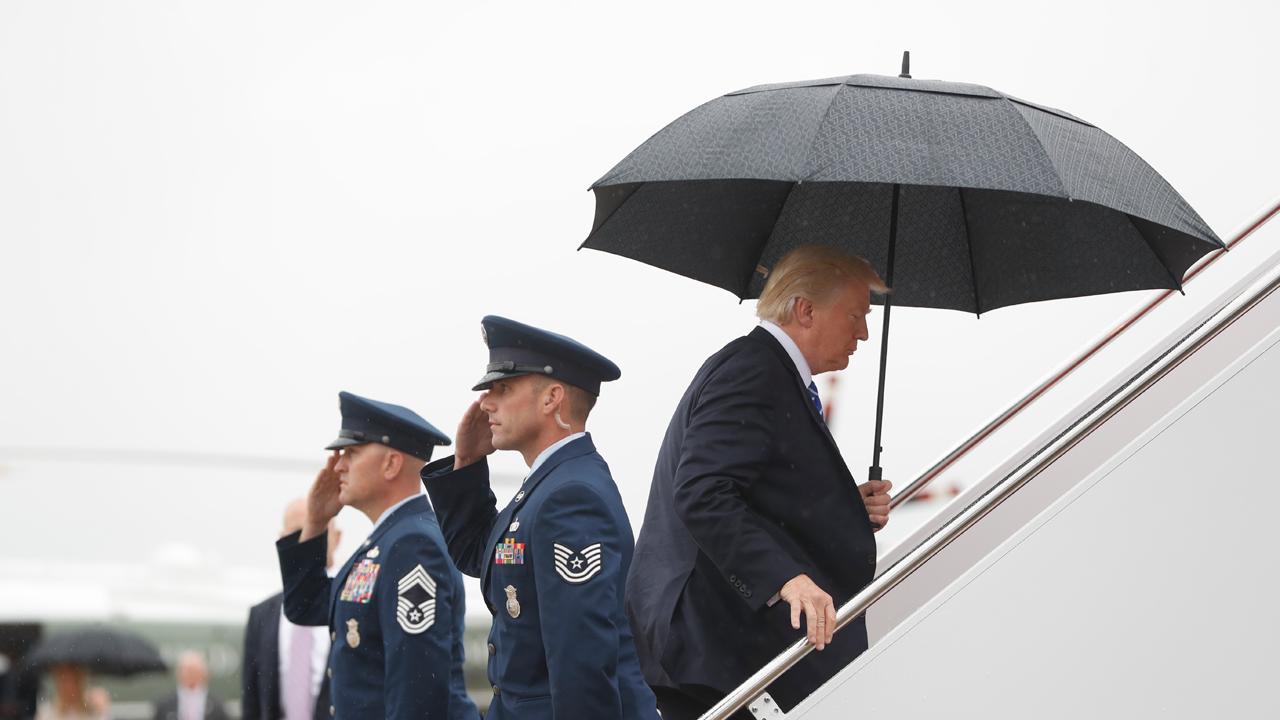Boeing betting on Trump to ramp up US growth in China
An added bonus for North Korea would be discord during the visit on regional trade or military burden-sharing issues with Japan and South Korea. Or any problems with China.
At a background briefing on the trip, a senior U.S. administration official said the White House believes the Chinese have done a great deal and "the U.S. is working more closely with China on the North Korea problem than ever," but added it wants more out of Beijing.
North Korea will be weighing the nuances of those meetings particularly closely.
— Eric Talmadge, AP Pyongyang Bureau Chief
___
TRADE
Trump has often named Asia, and China and Japan in particular, as a source of American economic woes. A persisting U.S. trade deficit with most Asian countries and the president's frequent threats to impose sanctions or raise tariffs on exports from the region make trade a fraught issue.
"We have trade deficits with China that are through the roof," he said Wednesday. "They're so big and so bad that it's embarrassing saying what the number is. But you know what the number is. And I don't want to embarrass anybody four days before I land in China, but it's horrible."
Trump repeatedly called China a currency manipulator during the presidential campaign in 2016, saying "they're killing us" by devaluing the yuan to make it harder for American companies to compete against Chinese products, even though Beijing was struggling to prevent the yuan's value from falling. He threatened to impose tariffs of up to 45 percent on Chinese goods.
Since he took office, though, the need for Beijing's help in countering threats from North Korea has helped temper his approach. His administration is pressing Beijing to give American companies more access to its state-dominated economy and held talks aimed at lowering the huge trade deficit with China. But it has refrained from designating China a currency manipulator.
Trump's decision to pull the U.S. out of the Trans-Pacific Partnership trade pact left the other 11 members bereft of the agreement's $12 trillion anchor consumer market. The remaining TPP countries, from vast Canada to tiny oil sultanate Brunei, are thrashing out a framework for moving forward without the U.S. An agreement may be reached in time for the regional APEC economic summit in Vietnam.
The country-to-country agreements that Trump prefers over multi-nation deals such as the TPP could be discussed during stops in Tokyo, Beijing and other regional capitals. That includes a free trade agreement with South Korea, which Trump is seeking to renegotiate. He said Wednesday that it's very important for the U.S. to renegotiate its trade deals.
"Our trade deals are horrible," he said. "They were made by people that, honestly, it's sad. It's very sad for our country. Every trade deal we have is disastrous."
— Elaine Kurtenbach, AP Asia Business Editor
___
SOUTH CHINA SEA
One of the world's busiest sea lanes, the South China Sea is a trouble spot where Trump can showcase American leadership and commitment to the region in a high-profile way. Or display a lack of both.
China, the largest and most aggressive of six claimant states in the disputed waters, has alarmed others by transforming seven barren reefs and atolls into islands — three with military-grade runways — in an impressive feat of engineering. It has even reportedly installed a missile-defense system on newly built islands in the hotly contested Spratly archipelago.
While China denies that it has hegemonic ambitions in the strategic waterway, it insists it has indisputable sovereignty over virtually the entire sea and declares itself ready to fight for every inch of it. It ignored a landmark ruling by a U.N.-linked arbitration tribunal last year that invalidated China's sprawling territorial claims, despite calls by the U.S. and others to uphold the rule of law.
Under Trump, the U.S. Navy has continued "freedom of navigation operations" and naval drills in the South China Sea in a challenge to China's claims, but many wonder whether Trump will do more at a time when he is seeking Beijing's help in reining in North Korea's nuclear ambitions, an issue which tops his national security concerns.
The dynamics of the territorial disputes have changed too. Philippine President Rodrigo Duterte, unlike his predecessor, has tried to veer away from his country's close alliance with the U.S. and reached out to China and Russia. Duterte, who will chair the ASEAN summit meetings that Trump will attend, has stopped joint patrols with the U.S. in the disputed waters and considerably toned down his country's criticism of China over the sea disputes.
"You have the chairman of ASEAN, Philippines, and China, the leading claimant country, essentially saying the situation is fully stable, there's no reason for external interference," Manila-based analyst Richard Heydarian said. "So, it's going to be much more difficult to talk about the South China Sea than North Korea, where there's a consensus across the board that there is a problem."
— Jim Gomez, AP Manila Chief Correspondent




















